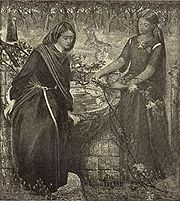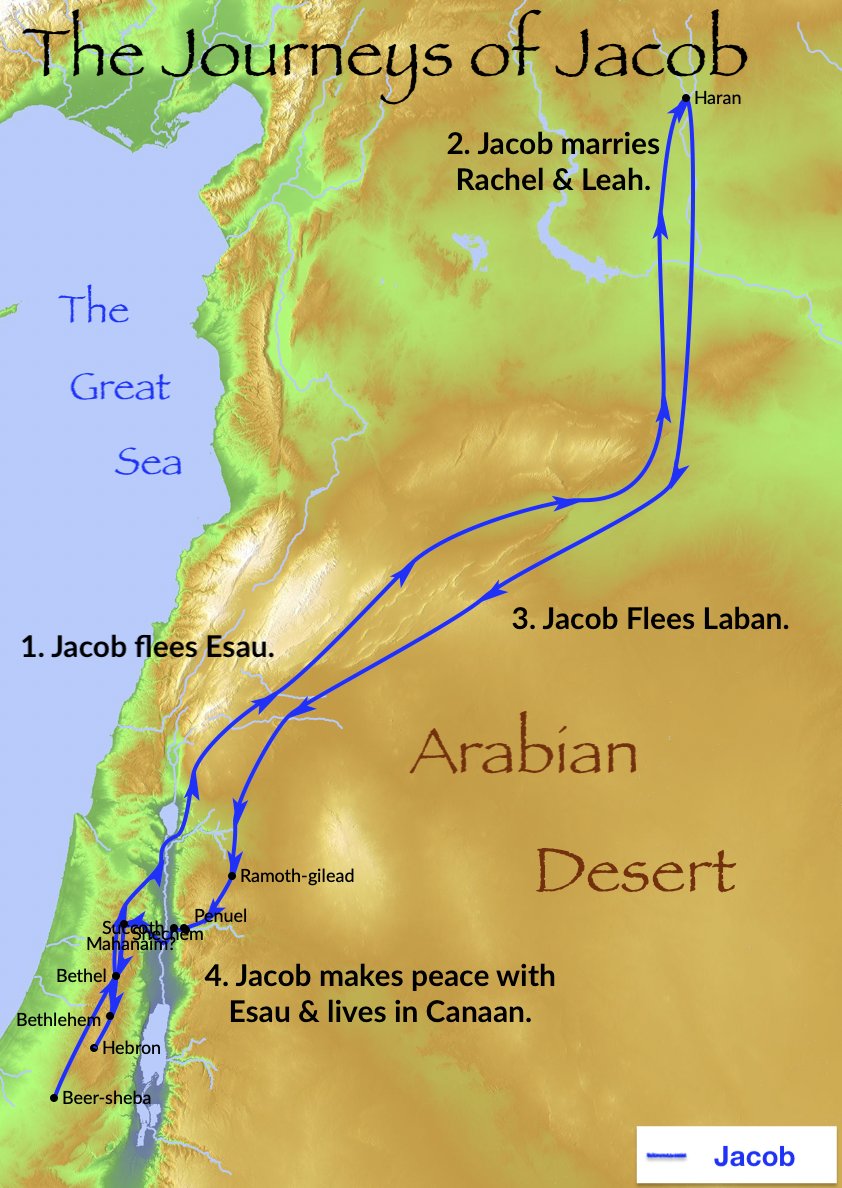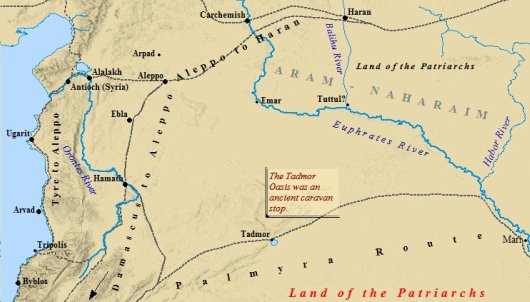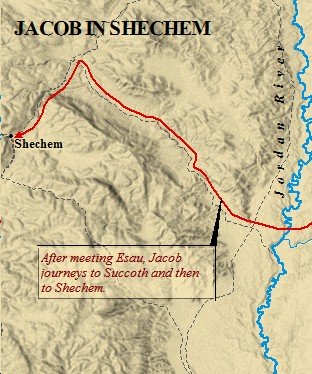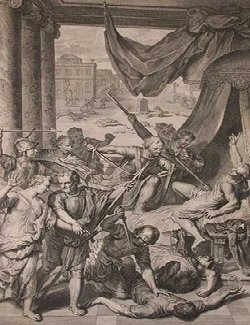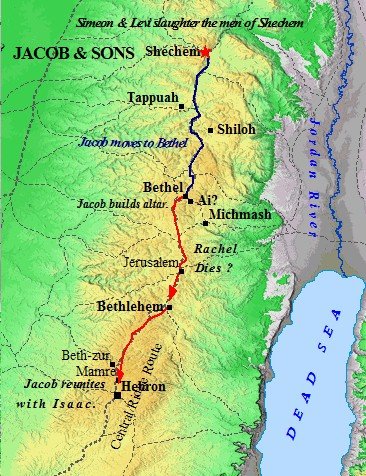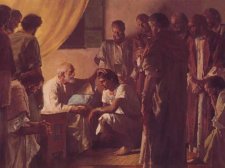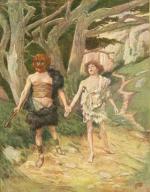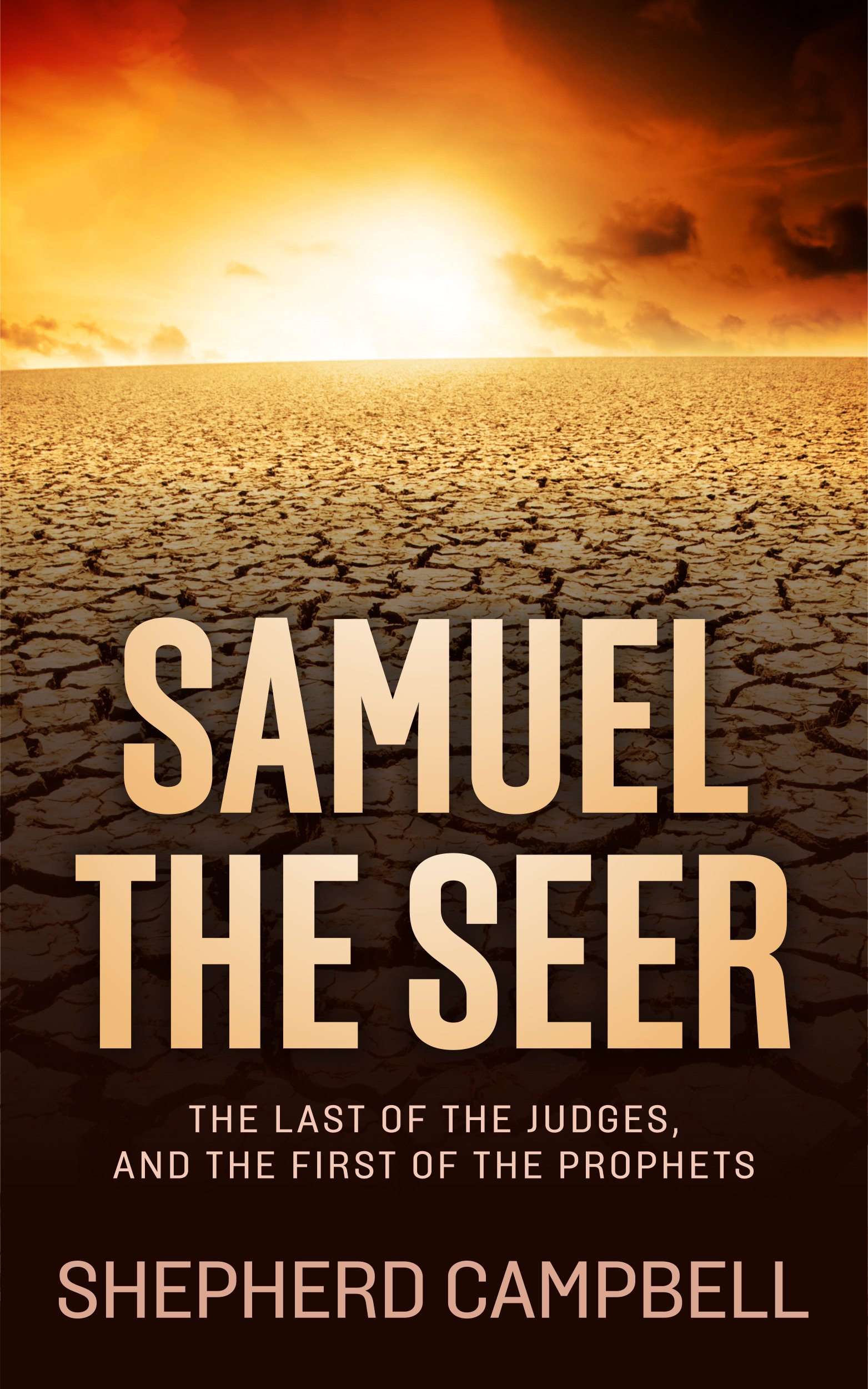- Biblical Maps
- Home Page
- History of Israel Blog
- Ancient Mesopotamia
- Map of Palestine
- Abraham
- Ancient Israel
- 12 Tribes of Israel
- Jerusalem
- The Book of Isaiah
- Palestine
- The Habiru
- Contact Us
- Bible Study Forums
- Media Page
- Visitors Sitemap
- Privacy Policy
- The History of the Old Testament
- In the Days of Noah
- The City of Jericho
VISIT OUR FACEBOOK PAGE!
The Tribes of Israel
Jacob's Family & The Tribes of Israel
The development and evolution of the Israel took place over the course of hundreds of years. The process began with the call of Abraham, and continued through the birth of Isaac. However, with the birth of Jacob, and subsequently his twelve sons, the tribes began to evolve and appear in the Old Testament.
The time period involving the early patriarchs is far from being agreed upon. William F. Albright, one of the leading Biblical Archaeologists of his time, wavered on the dating of Abraham. It is generally believed Abraham lived around 2000 B.C. Jacob, thus, has been argued to have lived around 1850 B.C.
The unification of Israel under Saul would not take place until
around 1000 B.C. In between, was the migration of Jacob to Egypt, the
400 year stay in Egypt, the Exodus out of Egypt under Moses, and the
conquest of Canaan under Joshua.
These events would shape and transform Israel from a loose confederation of tribes to a world Empire.
However, the foundation upon which the tribes of Israel would be built was set much earlier, during the sojourn of Jacob and his sons, both in Mesopotamia and in the land of Canaan.
Genesis 29:32
"And Leah conceived, and bare a son; and she called his name Reuben: for she said, Surely the Lord hath looked upon my affliction; now therefore my husband will love me."
With these words were born the twelve tribes of Israel. Reuben was the first born son of Jacob, through his wife Leah, and would become the head of the tribe of Reuben.
Jacob would father 11 other sons, through four different women. Each
son would become the head and founder of his particular tribe.
The Hebrew phrase Bnei Yisrael is used to denote the Israelites in the Bible. The literal translation of this phrase is, "sons of Israel".
From this phrase, Scripture uses a number of different appellations when referring to the 12 tribes of Israel.
Throughout the Old Testament, God's people are referred to as; "Sons of Israel"; "Children of Israel"; "House of Jacob"; "House of Israel"; "Israel".
Mentioned as a side note almost, in Genesis 30:21, is the birth of the only daughter of Jacob named in Scripture, Dinah. She would later figure prominently in the narrative. She was born to Leah, "some time later" after the birth of Zebulun, and before Rachel's birth of Joseph.
TRIBES OF ISRAEL PAGE CONTENTS
Click on a link to view that section of this page.
Jacob & Sons Move12 Sons of Jacob
In their order of birth, the 12 sons of Jacob are as follows: Reuben (Gen. 29:32), Simeon (29:33), Levi (29:34), Judah (29:35), Dan (30:5), Naphtali (30:7), Gad (30:10), Asher (30:12), Issachar (30:17), Zebulun (30:19), Joseph (30:23), and Benjamin (35:18).
The following are the 12 sons of Jacob grouped together by birth mother.
Leah
Reuben, Simeon, Levi, Judah, Issachar and Zebulun
Zilpah - Leah's handmaiden
Gad and Asher
Bilhah - Rachel's handmaiden
Dan and Naphtali
Rachel
Joseph and Benjamin Interestingly, all but one son (Benjamin) of Jacob was born in Mesopotamia, in the city of Haran. Haran was also the name of the brother of Abraham who had prematurely died (Gen. 11:28), and where he and Terah stopped on their journey to Canaan.
This further strengthens the Biblical ties between the Holy Land and Paddam - Aram, the same area known as Aram - Naharaim to Abraham.
Some scholars have taken a matriarchal view of the twelve tribes of Israel. This line of thought follows the idea that the sons of Leah and Rachel indicate an early entrance into, what would become, the twelve tribes of Israel.
Thus, the founding tribes were attributed to the wives of Jacob; the tribes of Leah, and the tribes of Rachel.
The sons of Bilhah and Zilpah indicate a later entrance into the tribes of Israel. These tribes are less prestigious than the founding tribes.
This theory, of course, denies the Biblical account. However, it does illuminate the polygamous nature of Jacob's family. As was seen in the instance of Abraham, Sarai, and Hagar , there surely existed rivalries, jealousies, and alliances amongst the wives and handmaidens of Jacob, as well as among the 12 sons of Jacob.
A natural result of these alliances and rivalries would have been the formation of cliques within Jacob's family. Power struggles were sure to take place amongst the wives, concubines, and sons of Jacob, each seeking to assert their place in the family hierarchy.
The interactions between each son of Jacob would prove to form a foundation upon which the tribes of Israel would interact with each other.
Thus, to understand the relationship between each tribe, it is important to understand the relationships between the sons of Jacob, and the wives/concubines of Jacob.
The personality and identity of each tribe began with the situations Jacob's family encountered in Canaan, and their interaction with the Canaanites living nearby.
Two instances from Scripture serve to personify the alliances and struggles which would evolve in such a complex and extended family. These instances would lead to pivotal changes made in the structure and organization of the tribes of Israel.
Dinah & Shechem
Genesis 34
After Jacob and Esau had reunited on good terms, Jacob moved his family to Shechem. Scripture relates Jacob purchased a "plot of ground where he pitched his tent" within sight of the city of Shechem.
He built an altar there, and named the place El Elohe Israel. El was one of the designations of God found in the Old Testament. The translation of this phrase, thus, means: "God, God of Israel".
It is also significant that, for the first time in Scripture, Jacob refers to himself by his new name, Israel. Thus, amidst a pagan land and people, Jacob had established a center of worship for the One True God. However, this would come at a price.
Genesis 34:1 sets the stage for the unfolding drama. Dinah, the daughter of Jacob, was said to have gone out and visited the "women of the land". Dinah was more than likely in her teens by now.
It is quite likely her older brothers, specifically the ones concerned in this story, were in their twenties.
Dinah had gone out to visit her friends. It is quite natural she, like all teenage boys and girls, needed friends amongst her peers.
As she was "hanging out", Shechem, the son of Hamor the Hivite, spotted Dinah amongst the local Canaanite girls. Hamor was the ruler of Shechem and its nearby area.
Shechem is called a "prince of the country", according to the the King James Version.
Shechem, undoubtedly, was used to getting what he wanted, when he wanted it. This encounter would be no different. Upon spotting Dinah, "he took her, and lay with her, and defiled her" (Gen. 34:1-2).
Scripture tells us Shechem's heart was drawn to Dinah, and he asked his father to obtain her as his wife.
Scripture is silent as to how Jacob found out about the incident. The Bible simply states his son's were in the fields with the flocks, and Jacob kept quiet about the incident until they returned home (Gen. 34:5).
Jacob's sons are said to have returned home "as soon as they had heard what had happened".
Upon arriving at home, they were "filled with grief and fury" (34:7).
Following their return, Hamor, the father of Shechem, approached Jacob and his sons with the offer for Dinah to marry Shechem. Hamor goes one step further and urges Jacob's family to intermarry with his people.
Hamor and Shechem show no remorse in their dealings with Dinah's family. The encounter between the two families in Scripture depicts Hamor as approaching Jacob and his son's as if with a business proposition. Strangely enough, Jacob is silent. His role in the narrative is over as soon as his sons arrive home.
Whatever the reason for this, it was a serious dereliction of duty on Jacob's part. As the father, and head of the household, he should have been the one dealing with Hamor.
However, Scripture indicates Hamor laid forth his offer to "Dinah's father and brothers" (34:11). It is only the son's of Jacob which reply to Hamor.
Scripture does not indicate how many, or which ones, of Jacob's sons were dealing with Hamor. Verse 13 informs us;
"Jacob's sons replied deceitfully as they spoke to Shechem".
It would seem, at this point in the narrative, the 12 sons of Jacob were acting together, as one, in dealing with Shechem and Hamor's request.
The interaction of Jacob's sons in dealing with this situation would foreshadow the relationship between the twelve tribes of Israel.
Which son of Jacob was the leader in their dealing with Hamor is not stated. Perhaps, Reuben was the spokesperson, as he was the oldest. Evidence from the passage may indicate either Simeon, Levi, or both, headed up the talks.
However, Scripture does record the brother's plan to get even. They convinced Shechem and Hamor they would give their sister to Shechem, only if he, and the rest of the men of Shechem, were circumcised (34:14-17).
Hamor sought to intermarry with the Israelites. By doing this, he felt he would be in position to eventually absorb their clan into his kingdom.
With this plan in mind, Hamor and Shechem jumped on the opportunity to obtain the graces of the sons of Jacob. They convinced all of the Shechemites to be circumcised, no doubt with the intention of fully exploiting and absorbing the "inferior" Israelites over time.
Yet, Simeon and Levi had other plans in mind. Scripture implies the third day after circumcision is the time when an individual is at his most vulnerable. The Israelites would have been well aware of the side effects, and recovery time needed after such an operation.
Verse 25 describes the action taken by these two son's of Jacob. They are the only sons mentioned in the slaughter.
"Three days later, while all of them were still in pain, two of Jacob's sons, Simeon and Levi, Dinah's brothers, took their swords and attacked the unsuspecting city, killing every male."
Scripture does not divulge details regarding their attack. It is more than likely Simeon and Levi led forces from their own households to attack Shechem.
As was the case with Abraham, fighting men were frequently employed under a single household. The fighting men of a household may have included blood relations, but also included mercenaries, servants, slaves, etc.
It would seem logical, in this instance, that Simeon and Levi led the fighting men of their house against the men of Shechem in a carefully planned and executed surprise attack.
This, of course, is speculation, and should be taken as such. However they accomplished their mission, Scripture does not divulge specifics.
What is evident, is that Simeon and Levi acted independently of the other sons in their vengeance on Shechem. This, as stated above, would become the modus operandi of the 12 tribes of Israel up until the coronation of Saul.
Each of the tribes of Israel acted independently of the others, united only by the belief in the God of Abraham, Isaac, and Jacob.
The action taken by Simeon and Levi drew the wrath of their father. Jacob responded to their actions in Gen. 34:30.
"Then Jacob said to Simeon and Levi, 'You have brought trouble on my be making me a stench to the Canaanites and Perizzites, the people living in this land. We are few in number, and if they join forces against me and attack me, I and my household will be destroyed."
Further disapproval is seen in Jacob's Blessing to his sons before his death. The blessing of Simeon and Levi occurs in Genesis 49:5-7.
"Simeon and Levi are brothers-their swords are weapons of violence. Let me not enter their council, let me not join their assembly, for they have killed men in their anger and hamstrung oxen as they pleased. Cursed be their anger, so fierce, and their fury, so cruel! I will scatter them in Jacob and dispense them in Israel."
Following this incident in Scripture, Jacob uproots his family, per instruction by God, and moves them to Bethel. There, God reaffirms His covenant with Israel/Jacob. Jacob then built an altar to God, named the place Bethel, and again moves his family.
From Bethel, they set out for Bethlehem, called Ephrath in the narrative. Along the way, Rachel died and was buried. Rachel's death would prove to be the catalyst for an even which would forever alter the make-up of the tribes of Israel.
Reuben
Occasionally, tribes formed an alliance with each other in times of distress. The Song of Deborah, found in Judges 5, illuminates this point.
This passage simultaneously illustrates the autonomy of the twelve tribes of Israel. It clearly states some tribes did not care for the distress of their brethren, and would not join the alliance. The tribe of Reuben was guilty of such an act.
Judges 5:15-16
"...In the districts of Reuben there was much searching of heart. Why did you stay among the campfires to hear the whistling for the flocks?"
Yet even before the Song of Deborah, Reuben is seen in acts of disobedience and disrespect. Being the first born son of Jacob, Reuben was set to inherit the birthright, and the inheritance from Jacob. As the oldest son, he would have been the head of the 12 sons of Jacob.
In fact, in the story of Joseph, Reuben and Judah are the only two brothers mentioned by name. Reuben convinced the other brothers to throw Joseph into a well, rather than killing him.
When he returned to rescue Joseph, Joseph was gone, already sold by the other eleven brothers.
The fact Reuben swayed them from killing Joseph does not free him from guilt for taking part in the plot. As the oldest and chief among them, he likely could have prevented it from happening altogether.
He, too, was jealous of Joseph, and resented his dreams. Consequently, Reuben sought to harm Joseph, and joined in on the plot.
Reuben's most damning sin occurs in Genesis 35:22. This instance would lead to Reuben being stripped of his birthright, and pave the way for the two sons of Joseph to take their place among the tribes of Israel.
In Scripture, this incident follows the death of Rachel, and the family's subsequent arrival in Bethlehem.
"While Israel (Jacob) was living in that region, Reuben went in and slept with his father's concubine Bilhah, and Israel heard of it."
Scripture does not give any more detail concerning this situation. Henry Morris claims Reuben was probably close to 30 years old and unmarried when this happened.
Though Scripture does not give details, Morris forms a theory based on the chronology of Scripture.
In verse 19 of the same passage, Rachel dies giving birth to Benjamin. Bilhah was Rachel's handmaiden, and significantly older than Reuben.
Perhaps she sought to replace Rachel in Jacob's family as a legitimate wife. Jacob, however, did not respond in kind.
Speculating further, Bilhah may have become irritated, and sought legitimacy elsewhere. Scripture indicates no act of rape or seduction between Bilhah and Reuben, so the implication is it was mutual consent between the two.
This would have serious implications towards the development of the tribes of Israel.
To further demonstrate the wickedness of this act, Bilhah was the mother to two of Reuben's younger brothers, Dan and Naphtali. Though Scripture does not divulge how Israel found out, it leaves little question as to how he felt about the actions of his eldest son.
The repercussions of this act are not fully revealed in Scripture until the time of Jacob's death. In Genesis 48:22 Jacob converses with Joseph after blessing Manasseh and Ephraim.
"Then Israel said to Joseph, 'I am about to die, but God will be with you and take you back to the land of your fathers. And to you, as one who is over your brothers, I give the ridge of the land I took from the Amorites with my sword and bow."
It is clear from this passage the birthright had fully been transferred to Joseph. As firstborn, Reuben should have been the "one who is over your brothers".
However, Jacob clearly indicates it is to be Joseph. Even though this verse does not state Reuben's sexual deviance was the reason for Joseph's exaltation, Jacob's blessing of his sons in the subsequent chapter does.
Genesis 50:2-4
"Assemble and listen, sons of Jacob; listen to your father Israel. Reuben, you are my firstborn, my might, the first sign of my strength, excelling in honor, excelling in power. Turbulent as the waters, you will no longer excel, for you went up onto your father's bed, onto my couch and defiled it."
Thus, with these words, Reuben's fate, as well as the fate of the tribe of Reuben, was sealed. This would significantly alter the tribes of Israel.
Because Jacob removed the birthright from Reuben, and gave it to Joseph, he sought to bless Joseph and exalt him above all his sons.
Resultingly, the two sons of Joseph were awarded tribes. The original 12 tribes of Israel, named after the 12 sons of Jacob, were altered, and two additional tribes, from two grandsons of Jacob, were instituted.
The tribes of Manasseh and Ephraim, therefore, were born out of an act of disrespect and immorality on the part of Reuben.
The tribe of Reuben was to suffer dire consequences in the fulfillment of Jacob's prophecy. They chose not to take part in the struggles of the other tribes of Israel during the conquest. Instead, they sat idly by, as indicated above in the Song of Deborah.
Eventually, the tribe of Reuben would fall into a state of complete apostasy. As a result, the tribe of the eldest son of Jacob was the first to be exiled by the Assyrian Kings Pul and Tiglath-pilesar, after their conquest of the Northern Kingdom of Israel.
Conclusion
The Bible clearly indicates the tribes of Israel were rarely in unanimous agreement with each other. It also clearly sets this precedent in the interactions between the 12 sons of Jacob.
The actions of Simeon and Levi foreshadow the independent nature of each tribe. The plot of the brothers to rid themselves of Joseph illustrate the tension and conflict within Jacob's family, and foreshadows the tension and conflict later seen within the tribes of Israel.
This internal conflict manifested itself in the story of the destruction of the Benjamites by the other eleven tribes of Israel, following the incident of the Levite and concubine in Judges 19.
This incident provoked a civil war within Israel, and the near annihilation of the tribe of Benjamin.
The actions of Reuben foreshadow the actions of the tribe of Reuben, along with those of Gad. As Reuben defiled his father's bed, with no regard for his authority, so the tribes of Reuben and Gad would have no regard for the conquest of the land west of the Jordan.
They chose, instead, to remain idle, and tend to their own business while their brethren shed blood for the fulfillment of God's promise.
Reuben's denunciation by Jacob would also foreshadow the eventual dissolution of those tribes by the Assyrians. As stated above, the tribe of Reuben was among the first deported following the Assyrian invasion.
It was at this time the tribe of Reuben lost their identity as the chief of the tribes of Israel. The House of Joseph now held this title.
Despite the conflict and turmoil within the sons of Jacob, and later the tribes of Israel, God would keep a firm grip on His people. As the tribes grew and evolved, they would have incorporated more and more people not of blood relation.
Though this would have lessened the ancestry within each tribe, it did not eliminate altogether the tribe's identity with the respective son of Jacob.
Indeed, common lines of descent, and the belief in the God of Abraham, Isaac, and Jacob, would prove to hold the tribes together, not only individually, but as a collective whole, and unite them under a common vision. However, it would be hundreds of years later before the tribes became politically united.
In 586 B.C. king Nebuchadnezzar of Babylon fell upon Jerusalem. The nation of Israel ceased to exist as a sovereign entity. The tribes of Israel struggled to maintain their identities. It would not be until 1948 AD - 2,534 years after Nebuchadnezzar - that Israel would regain her national sovereignty.
Back to the 12 Tribes of Israel
Back to Home Page
Recent Articles
-
The History of Ancient Israel
Dec 25, 23 02:16 PM
An easy to read history of ancient Israel from Old Testament times to today. -
The Ancient City of Jericho
Dec 18, 23 11:21 PM
The city of Jericho is one of the most ancient cities on earth. The city played a crucial role in a number of Bible stories. -
Story of Cain and Abel
Dec 17, 23 01:20 PM
The story of Cain and Abel is a tragic story of jealousy, rage and fratricide. It is the first murder in recorded history.
SAMUEL the SEER
Now Available in Print & eBook on Amazon!!
POPULAR TOPICS
Learn more about these popular topics below. The Bible is full of fascinating stories, characters and mysteries!
BIBLE MAPS
Explore the land of the Old Testament! View these maps of the Bible.
